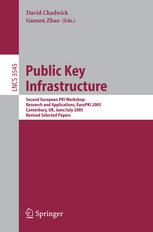

Most ebook files are in PDF format, so you can easily read them using various software such as Foxit Reader or directly on the Google Chrome browser.
Some ebook files are released by publishers in other formats such as .awz, .mobi, .epub, .fb2, etc. You may need to install specific software to read these formats on mobile/PC, such as Calibre.
Please read the tutorial at this link: https://ebookbell.com/faq
We offer FREE conversion to the popular formats you request; however, this may take some time. Therefore, right after payment, please email us, and we will try to provide the service as quickly as possible.
For some exceptional file formats or broken links (if any), please refrain from opening any disputes. Instead, email us first, and we will try to assist within a maximum of 6 hours.
EbookBell Team

4.0
76 reviewsThis book contains the proceedings of the 2nd EuroPKI Workshop — EuroPKI 2005, held at the University of Kent in the city of Canterbury, UK, 30 June–1 July 2005. The workshop was informal and lively, and the university setting encouragedactive exchangesbetween the speakersand the audience. TheworkshopprogramcomprisedakeynotespeechfromDr.CarlisleAdams, followedby18refereedpapers,withaworkshopdinnerinandguidedtouraround the historic Dover Castle. Dr. Adams is well known for his contributions to the CAST family of s- metric encryption algorithms, to international standards from the IETF, ISO, and OASIS, authorship of over 30 refereed journals and conference papers, and co-authorship of Understanding PKI: Concepts, Standards, and Deployment Considerations (Addison-Wesley). Dr. Adams keynote speech was entitled ‘PKI: Views from the Dispassionate “I”,’ in which he presented his thoughts on why PKIhas been availableas an authentication technology for many years now,but has only enjoyed large-scale success in fairly limited contexts to date. He also presented his thoughts on the possible future(s) of this technology, with emp- sis on the major factors hindering adoption and some potential directions for future research in these areas. In response to the Call for Papers, 43 workshop papers were submitted in total. All papers were blind reviewed by at least two members of the Program Committee, the majority having 3 reviewers, with a few borderline papers h- ing 4 or more reviewers; 18 papers were accepted for presentation in 8 sessions.